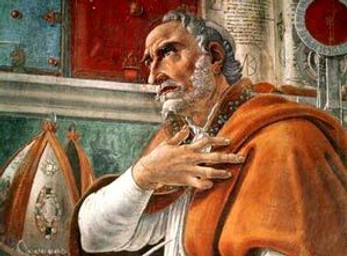
“Happy are those who live in your house, continually singing your praise!
Happy the pilgrims whom you strengthen, to make the ascent to you” (Psalm 84, 5-6)
Saint Augustine
Following studies in Tagaste and later in Carthage, Augustine became a teacher of rhetoric, first in his native town, then in Rome and finally in Milan. His journey from city to city, occasioned by various opportunities and challenges, was suggestive of a more important spiritual journey that he made over a long period of time, in search of inner peace and lasting happiness. The example, prayers, and influence of Monica had no little part to play in the drama of her son’s spiritual itinerary, and Augustine ascribes largely to her his conversion to the Catholic faith. He was baptized at the age of 33 by Bishop Ambrose of Milan. Augustine’s decision to embrace the Catholic faith was at the same time a commitment to spend the remainder of his life as a "servant of God," that is, in celibacy, even though he had been living for years with a woman whom he deeply loved, and with whom he had fathered a son, to whom he gave the name Adeodatus.
Following baptism, which Augustine received together with Adeodatus and with Augustine's own good friend, Alypius, he set out for his native town where he wished to pursue a monastic style of life together with other men who had likewise experienced a radical conversion to the faith. On the journey, at Ostia Antica, just outside of Rome, Monica took sick and died suddenly but happily, having witnessed Augustine’s total commitment to Christ and the Church.
At Tagaste, Augustine, Adeodatus, and several companions lived an intense life of prayer, work and fellowship, sharing their insights about Scripture and the Christian vocation. After three years, however, while on a visit to the city of Hippo, about fifty miles distant from Tagaste, Augustine was called to become a priest, contrary to his wishes, but disposed, nevertheless, to accept what he believed was God’s will for him. In Hippo, too, he established a monastic community, which he directed while assisting the bishop, Valerius. Several years later Augustine succeeded Valerius as head of the diocese, and feel constrained to move to the bishop’s house so as not to disturb the peace of the monastic community, he wrote his Rule for its continued direction and then established yet a third community for clerics in his new episcopal residence. Thus from the time of his return to Tagaste until his death, Augustine resolutely opted for a monastic style of life in the community.
As bishop, Augustine found his desired life of contemplation and separation from worldly concerns necessarily influenced and refashioned by his many obligations as leader of the local Church and as a civil official, which the office of bishop at the time included. In addition to his pastoral duties within Hippo, he travelled to church councils in the region of North Africa – forty to fifty times over the course of the 35 years he served as bishop. He made the nine-day journey to Carthage, the metropolitan see, for meetings with other bishops some thirty times. But even these extensive travels, which Augustine always found to be a hardship physically, were modest in comparison with the great output of writings and sermons which he produced: over two hundred books and nearly a thousand sermons, letters and other works.
In the year 430 Augustine fell ill and took to his bed. His days and nights were spent praying the penitential psalms, which he asked to have written on the wall of his room. He died on August 28th, as the city of Hippo was being sacked by the Vandals. His body was laid to rest in Hippo, but was later taken to Sardinia for safe keeping, and finally to Pavia in Northern Italy, where it now rests in the Basilica of San Pietro in Ciel d'Oro.
Aurelius Augustine was born in 354 at Tagaste, Algeria, in North Africa, the son of Patricius, a non-believer, and his devout Catholic wife, Monica. Though he was enrolled as a catechumen by his mother when he was a boy, Augustine's baptism was deferred to a later time in accordance with the prevailing custom. From his earliest years, Augustine possessed an inquisitive mind and an attractive personality and set his sights on a career that would bring him both wealth and fame, goals that were heartily endorsed by his parents, who sought out opportunities to provide their son with the finest education possible.




.jpg)
.jpg)
